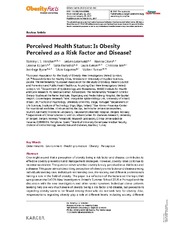Perceived Health Status: Is Obesity Perceived as a Risk Factor and Disease?
Visscher, Tommy L.S.; Lakerveld, Jeroen; Olsen, Nanna; Küpers, Leanne; Ramalho, Sofia; Keaver, Laura; Brei, Christina; Bjune, Jan-Inge; Ezquerro, Silvia; Yumuk, Volkan
Peer reviewed, Journal article
Published version

Åpne
Permanent lenke
https://hdl.handle.net/1956/23317Utgivelsesdato
2017Metadata
Vis full innførselSamlinger
Originalversjon
https://doi.org/10.1159/000457958Sammendrag
One might expect that a perception of obesity being a risk factor and disease, contributes to effective obesity prevention and management strategies. However, obesity rates continue to increase worldwide. The question arises whether obesity is truly perceived as a risk factor and a disease. This paper aims at describing perception of obesity as risk factor and disease among individuals seeking care, individuals not seeking care, the society, and different professionals having a role in the field of obesity. The paper is a reflection of the lecture on the topic that was given at the EASO's New Investigators United's Summer School 2016 in Portugal and the discussion with the new investigators and other senior speakers. Individual obese patients seeking help are very much aware of obesity being a risk factor and disease, but perceptions regarding obesity seem to be flawed among those who do not seek help for obesity. Also, misperceptions regarding obesity play a role at different levels, including society, different political levels, the fields of health care and social work, prevention organizations, and the food and marketing industry. The food and marketing industry has an enormous role in changing perceptions by the society and policy makers. Obesity rates will continue to increase as long as individuals, the society, and professionals at different levels have false interpretations of the severity of obesity. Severe action is needed against those who are playing a role in maintaining false perceptions of obesity as a risk factor and disease.
